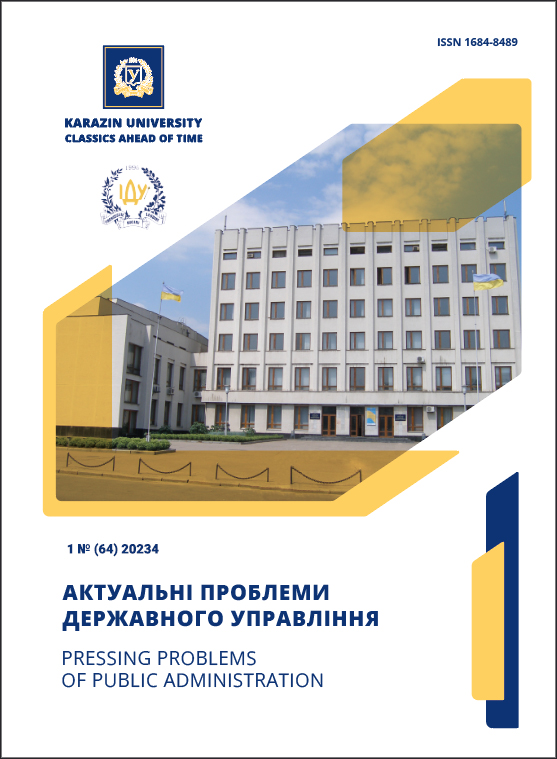Ефективність багаторівневого врядування та спільна політика безпеки і оборони ЄС в умовах гібридних загроз
Анотація
У статті обґрунтовано та доведено, що зосередженість на реалізації спільної політики та глобальних стратегій ЄС щодо побудови нової європейської моделі багаторівневого врядування, стратегічної безпеки та стійкості потребує як узгодженості всіх суб’єктів прийняття рішень, так і забезпечення їх ефективності в умовах глобальних впливів та гібридних загроз. Уперше сформульовані основні положення трирівневої концептуальної моделі раціоналізації багаторівневого управління та запропоновано її використання у реалізації європейської політики у сфері безпеки і оборони в умовах гібридних загроз з урахуванням відповідних елементів послідовності у формуванні та реалізації публічної політики, що може значно оптимізувати визначення окремою країною учасницею – ступеня інтегрованості, готовності до інвестування та спроможності розвивати конкретний стратегічний напрям в межах ЄС, а також інших способів і засобів досягнення її цілей, алгоритмізації і доведення покрокового алгоритму розв’язання складних задач до суб’єктів реалізації програм і проєктів, як складових комплексного механізму координації в системі багаторівневого управління. Зроблено акцент на підвищенні ефективності реалізації спільної політики безпеки і оборони ЄС в умовах гібридних загроз та необхідності запровадження інтегрованого підходу у забезпечення національної стійкості країн Європи на основі концепту багаторівневого управління з урахуванням глобальних стратегій ЄС.
Завантаження
Посилання
Andrushenko, S. (2011). International political security. In Political Encyclopedia. Kyiv: Parliamentary Publishing House, 52–53. [in Ukrainian].
Dorosh, L., & Romanik, V. (2020). PESCO, CARD, EDF: Strategy, analysis and financing in the field of ensuring the security of the European Union. Humanitarian Visions, 6 (1), 1–7.
DOI: 10.23939/shv2020.02.001 [in Ukrainian].
Kopiika, V.V., Makovsky, S.O., & Myronova, M.A. (2021). European Union in international relations: A training manual. Kyiv: VPC “Kyiv University”. 560 p. [in Ukrainian].
Zavada, Y., & Sino, I. (2022). Common Security and Defense Policy of the EU at the modern stage: Main perspectives and threats. Politikus, 3, 71–76. [in Ukrainian].
Melnik, O. (2022). New security model in Europe: How will the “compass” strategy help Ukraine? Kyiv. URL: https://razumkov.org.ua/statti/nova-model-bezpeky-vyevropi-chym-dopomozhe-ukraini-strategiia-kompas [in Ukrainian].
Joint declaration of the Ministers of Foreign Affairs of Ukraine, the Republic of Poland and the Republic of Lithuania on the establishment of the “Lublin Triangle”. Government portal. (2020). URL :http://surl.li/lhqvfl [in Ukrainian].
Suvorov, V.P. (2023). Coordination as a mechanism for implementing the concept of multi-level governance in Ukraine. Theory and Practice of State Governance, 2(77), 54–69.
DOI: 10.26565/1727-6667-2023-2-04 [in Ukrainian].
Suvorov, V.P. (2023). Transformation of multi-level governance based on global strategies of the EU and national resilience of Ukraine in the face of hybrid threats. State Building, 2 (34), 183–196. DOI: 10.26565/1992-2337-2023-2-15 [in Ukrainian].
Khylyk, O.L. (2022). European Union in a changing world: Monograph. Kyiv: Zen’O. 219 p.
[in Ukrainian].
European Defence Fund: Factsheet 2019. Brussels: European Commission. (2019).
URL: https://ec.europa.eu/docsroom/
The European Centre of Excellence for Countering Hybrid Threats (Hybrid CoE).
The European Union’s global strategy. Three years on, looking forward. (2019).
URL: https://eeas.europa.eu/sites/default/files/eu_global_strategy_2019.pdf
Fiott, D. (2017). The CARD on the EU defence table. European Union Institute for Security Studies (EUISS). Berlin. URL: https://www.iss.europa.eu/sites/default/files/euissfiles/alert_10_card_0.pdf
Peters, B.G. (2018). The challenge of policy coordination. Policy Design and Practice, 1 (1), 1–11. DOI: 10.1080/25741292.2018.1437946
Karamyshev, D.V. (2018). Dominants of global governance in dimensions of global development. Theory and Practice of Public Administration, 4, 8–20 [in Ukrainian].
Karamyshev, D., Suvorov, V., & Sobol, R. (2024). Overcoming systemic vulnerabilities of the spheres of influence of hybrid threats in ensuring stability and comprehensive security in the conditions of European integration. Public Administration and Regional Development, 24, 628–647. DOI: 10.34132/pard2024.24.14 [in Ukrainian].
Morrison, T. (2002). Actionable learning: A handbook for capacity building through case-based learning. Tokyo: Asian Development Bank Institute. 515 p.
Permanent Structured Cooperation (PESCO): URL: https://www.pesco.europa.eu/binding-commitments/
Shared Vision, Common Action: A Stronger Europe. A Global Strategy for the European Union’s Foreign And Security Policy. (2016, June). URL: http://surl.li/ptqqil
A Strategic Compass for Security and Defence. (2022). URL: http://surl.li/bjxpbc

